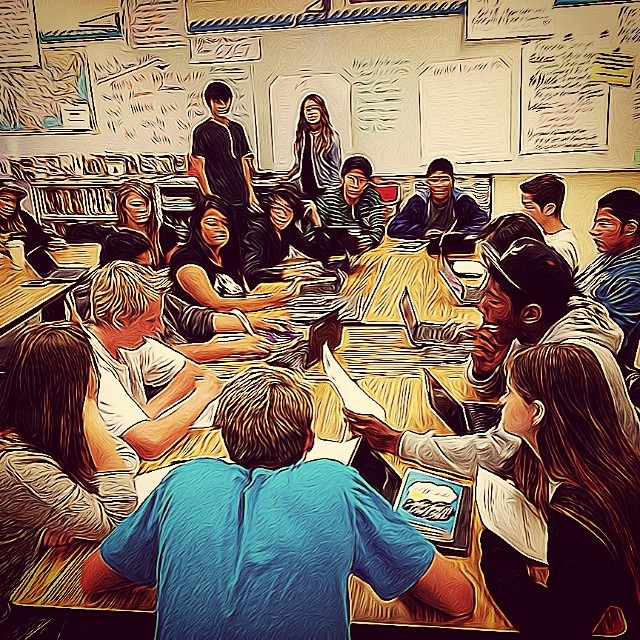Changing the world with a single conversation
“Being able to argue with people respectfully, even if they have awful, hateful, repulsive ideas, is what distinguishes us from the dictatorships and the tribal societies, where differences are settled by the sword if they are even settled at all.”—James Kirchick.
Some teachers and parents try to encourage having uncomfortable conversations in their classrooms and homes, yet most students and many adults continue to avoid these kinds of conversations to keep peace. The majority of them don’t even know how to respectfully disagree with someone.
Students and teachers need to be taught how to be attentive and polite while listening and talking to those who have different beliefs than they do. Having difficult conversations with someone that you disagree with doesn’t only help them and their mental acuity and health, but it helps yours as well.
Talking to those who don’t have the same beliefs and ideals that you do helps you gain knowledge and understanding of other topics, and also helps you understand why you believe what you believe.
Some people might say that discussing politics in a classroom is disruptive and damages the learning environment, but if students are able to argue respectfully, these conversations should have the opposite effect and promote growth and understanding.
On many occasions, I have participated in a debate or conversation in a classroom where others didn’t listen to me or they verbally attacked me and told me that I was wrong. I agree that these conversations were very distracting from the learning environment, and they didn’t help me learn (if anything, they made me want to not listen to others’ opinions). Because so many people have had similar experiences to mine, the majority of students and adults view difficult conversations as destructive. While conversations where the participants aren’t listening or aren’t being respectful of each other, distracts from the real purpose of the discussion. Healthy, respectful, and productive discussion is a skill that can and should be taught.
There are so many different programs that help teach students and adults how to have respectful and fruitful conversations. How to Defend the Faith without Raising Your Voice is a book by Austen Ivereigh that gives Catholics a way to use their faith to defend their beliefs on issues humanly and respectfully without pushing people away. “It is about winning friends, not arguments. It is about shedding light, not heat. It’s about reframing the argument so hearts can be opened and minds can be inspired.” Schools like Regis Jesuit could use sources like this book to teach their students how to discuss difficult topics respectfully, while using their faith to back up their reasonings.
Many people think that being stronger and more aggressive in our arguments will make others change their minds more effectively than discussing respectfully will. While I agree that being passionate about what you believe is an important aspect of these kinds of conversations, people are actually more willing to listen to what you have to say if you respectfully listen to them and don’t push away their ideas.
Oftentimes, children and adults are excluded from conversations, friendships, and other relationships just because of what they believe.
So many things are affected by exclusion, and one of those things is the mental health of those being excluded; having respectful conversations with those that you disagree with, helps improve the mental health of both you and those that you talk to. The University of Exeter led a study that concluded that, “both boys and girls who were excluded between the ages of 15 and 16 years may have poor, and in the case of girls, deteriorating, mental health.” It is so important that we include those who hold different beliefs than we do in our conversations because it helps their mental health, and it helps yours, but it also helps both of you grow in your understanding of the other’s beliefs as well as your own.
Things like mental health, relationships, and even big issues in our world are negatively affected when people refuse to have conversations with people that hold different beliefs than they do. We need to be able to talk to others without shooting down their ideas or their personal stories; we need to be able to listen to other opinions respectfully, because everyone’s opinions are important and valuable.
In preparation of the 2020 election, 526 diverse voters spent a weekend in a resort outside of Dallas, Texas to talk politics. Each one of them had their own personal experiences and their own reasons for why they believed what they believed. Over the four days that they were together, they debated foreign policy, health care, immigration, the economy, and the environment; but in the end, the voters said that they didn’t change their minds about these issues.
“I don’t think the purpose of this conference was to change people’s minds. I think the purpose of this conference was to get people to accept each other’s points of view in a civil manner”, said one of the participants after the weekend in Texas.
We hold conversations with those that we disagree with not to change their minds or make them agree with us, but to see why other people believe what they believe. Everyone has their own experiences, and each one is equally important.
It is important that we all know how to respectfully listen, argue, and even disagree with others. Because if you aren’t respectful in your conversations, people will not be willing to listen, and you will push people away more than you pull them in. Discussing difficult topics such as politics and controversies instead of avoiding them is essential for good relationships and classroom environments because it helps us grow in our understanding of others, and it allows us to understand more about why others believe what they believe.
Opinion contributors Bruce Bond and Erik Olsen wrote an article that talks about how important it is to engage in difficult conversations. “Even the most extreme in our society can change if we are willing to listen and engage.”. How can we coexist and compromise if no one is able to listen intently to one other’s ideas?




